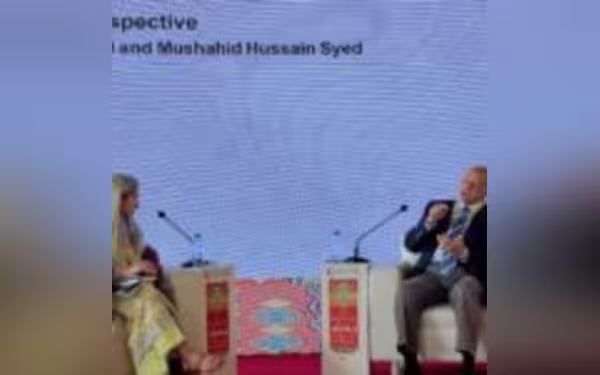Saturday, November 16, 2024 05:31 PM
Mushahid Hussain Advocates Stronger Pakistan-Bangladesh Relations
- Mushahid calls for strategic ties with Bangladesh.
- Student Revolution seen as pivotal for Bangladesh's identity.
- Visa-free travel and trade proposed to strengthen relations.
 Image Credits: pakistantoday
Image Credits: pakistantodaySenator Mushahid Hussain emphasizes the need for stronger ties between Pakistan and Bangladesh at the Islamabad Literature Festival.
In recent years, the geopolitical landscape of South Asia has undergone significant transformations, particularly with the rise of Bangladesh as a nation asserting its identity and independence. This shift has prompted discussions about the potential for stronger ties between Pakistan and Bangladesh, especially in light of historical events that have shaped their relationship. Senator Mushahid Hussain Sayed, a prominent Pakistani politician, recently addressed this topic at the Islamabad Literature Festival, emphasizing the importance of fostering strategic partnerships in the region.
During a panel discussion titled ‘Pakistan-Bangladesh Relations’, Senator Mushahid highlighted the recent developments in Bangladesh, referring to the ongoing Student Revolution against the pro-India regime of Prime Minister Haseena Wajid as the ‘Second Liberation’. He articulated that this movement signifies a rejection of Indian dominance in the region, marking a pivotal moment in Bangladesh's history. According to Mushahid, this revolution holds three significant implications for Pakistan.
Firstly, he noted that it offers closure to the painful chapter of 1971, a year that witnessed the separation of East Pakistan and the birth of Bangladesh. The senator asserted that the Indian narrative surrounding this event has been effectively challenged and buried. Secondly, he pointed out the emergence of a new identity for Bangladesh, one that he described as ‘Muslim Bengal’. This identity, he argued, is deeply rooted in the shared struggle for freedom that both nations experienced during the partition of India in 1947. Notably, the recent commemoration of Quaid-e-Azam Muhammad Ali Jinnah's death anniversary in Dhaka for the first time since 1971 underscores this evolving identity.
Thirdly, Mushahid emphasized that this moment presents a unique opportunity for Pakistan and Bangladesh to restore their historical ties and foster a spirit of brotherhood. He called for the establishment of visa-free travel and open trade between the two nations, suggesting that such measures would strengthen their relationship. He metaphorically described the connection between Pakistan and Bangladesh as being tied together with an ‘umbilical cord’, highlighting the deep-rooted bonds that exist between the two countries.
Furthermore, Senator Mushahid pointed out the ideological animosity that India harbors towards both Pakistan and Bangladesh, stemming from its ‘Akhand Bharat’ ideology. He recalled the words of former Indian Prime Minister Indira Gandhi, who, after the 1971 conflict, proclaimed that India had taken revenge after a millennium. This sentiment, he noted, is echoed in the rhetoric of current Indian leaders, including Prime Minister Modi.
In light of these developments, Mushahid Hussain argued that Pakistan now possesses the strategic space to adopt a proactive foreign policy in South Asia. He urged for the restoration of ties not only with Bangladesh but also with other neighboring countries like Nepal, Sri Lanka, and the Maldives, all of which share concerns regarding Indian hegemony.
The call for stronger ties between Pakistan and Bangladesh is not merely a political maneuver; it is a recognition of shared history and cultural connections. As both nations navigate the complexities of regional politics, the potential for collaboration and mutual support could pave the way for a more stable and prosperous South Asia. The emphasis on youth exchange and educational collaboration further underscores the importance of building bridges between the two countries, fostering a future where both can thrive together.













